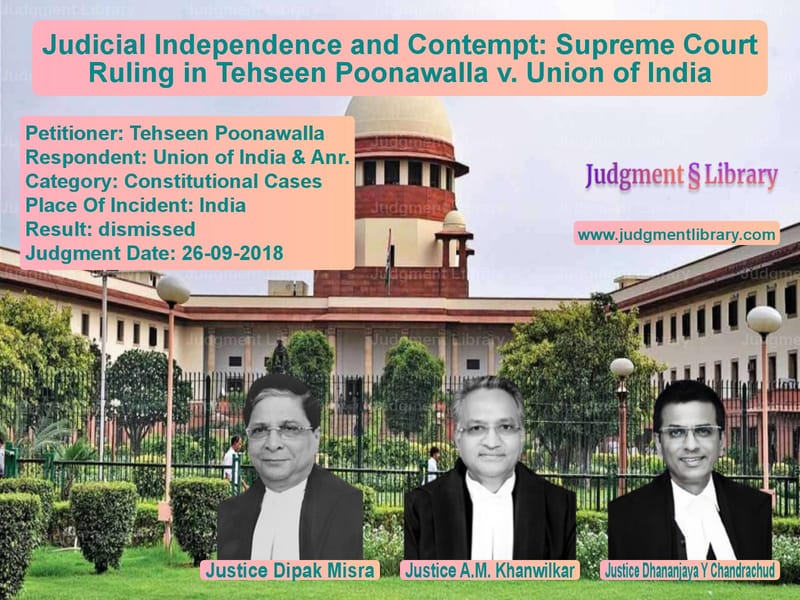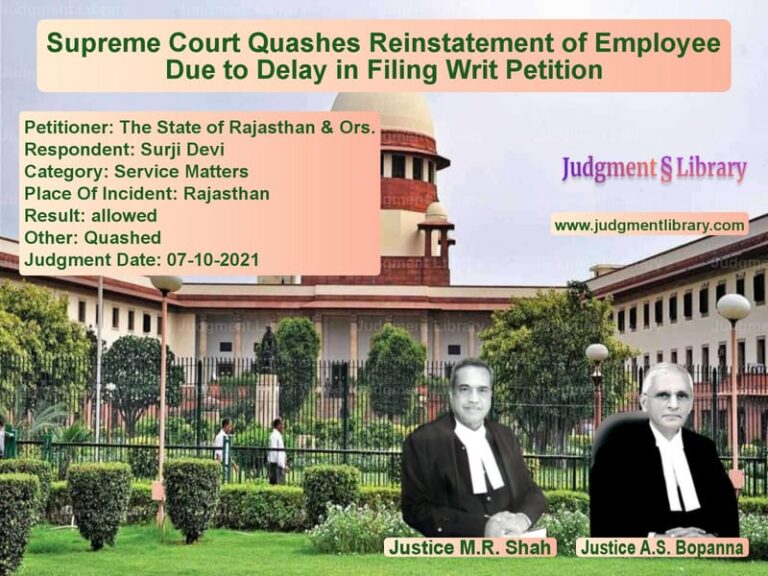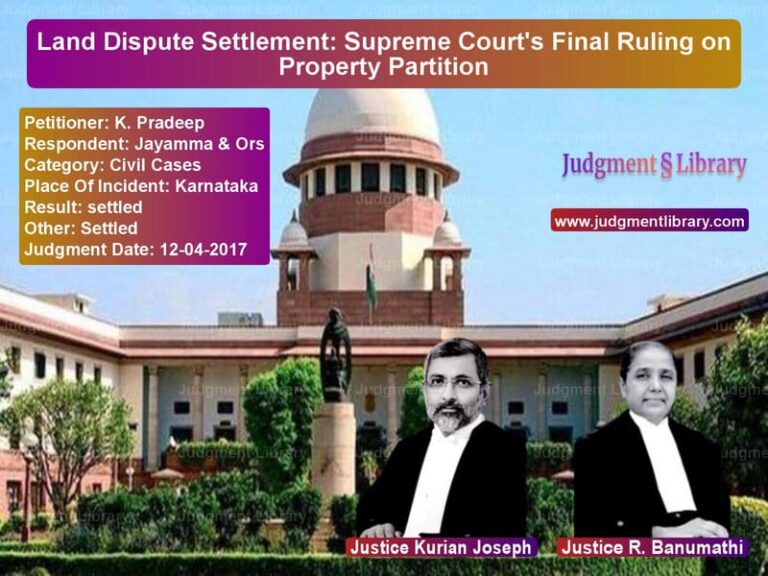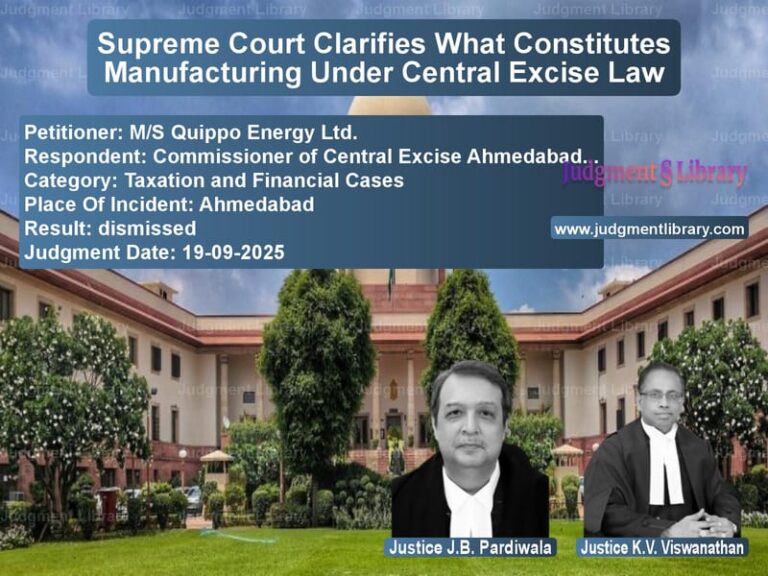Judicial Independence and Contempt: Supreme Court Ruling in Tehseen Poonawalla v. Union of India
On 26th September 2018, the Supreme Court of India delivered a significant judgment in Tehseen Poonawalla v. Union of India & Anr., addressing the issue of judicial independence, contempt of court, and procedural integrity. The ruling examined whether certain submissions made by counsel in an earlier case amounted to contempt and whether previous court observations required modification.
The Supreme Court ruled that remarks made against legal counsel in prior proceedings were not directed personally at an individual but were part of broader observations regarding judicial processes. The judgment underscores the importance of upholding **judicial decorum** while ensuring that counsel have the right to represent their clients without fear of reprisal.
Background of the Case
The case arose from a Miscellaneous Application (MA No. 1607 of 2018) filed by **Ms. Indira Jaising**, seeking deletion or modification of remarks made in an earlier Supreme Court ruling dated **19th April 2018**. The case related to the circumstances surrounding the death of **Judge B.H. Loya**, which had led to extensive litigation, including various petitions and interventions.
The remarks in question were contained in **paragraphs 74, 75, 76, and 78** of the original judgment, where the Supreme Court observed that the actions of the petitioners and intervenors **scandalized the process of the court and amounted to prima facie contempt**.
Legal Issues Considered
The Supreme Court examined the following legal issues:
- Do the observations in the original judgment amount to a **personal indictment of counsel**?
- Does seeking judicial scrutiny of a legal matter amount to **scandalizing the judiciary**?
- Can the Court expunge observations that were part of a reasoned order?
Arguments by the Petitioner (Indira Jaising)
The petitioner, through senior advocate **Dr. Abhishek Manu Singhvi**, submitted that:
- The remarks made in the judgment could be interpreted as a **personal indictment** of her conduct.
- There was no intent to scandalize the judiciary or interfere with judicial independence.
- The petition was filed in **good faith to protect judicial processes** and was not intended to cast aspersions on the court.
- The Supreme Court should issue a clarification stating that the petitioner had **not engaged in contemptuous conduct**.
Arguments by the Respondents (Union of India and State of Maharashtra)
Representing the **State of Maharashtra**, senior advocate **Mr. Mukul Rohatgi** argued:
- The remarks in the judgment were **not directed personally** at Ms. Jaising but at the **overall conduct of the petitioners and intervenors**.
- The judgment had already **settled the controversy** surrounding the Judge Loya case, and the attempt to expunge remarks was a way to revive the debate.
- The petitioner had in fact urged contempt notices against the **Administrative Committee of the Bombay High Court**, which justified the original court observations.
- The prayer to summon records of the **Administrative Committee meeting from 25th June 2014** indicated an attempt to reopen settled legal matters.
Supreme Court’s Observations
The Supreme Court, comprising **Chief Justice Dipak Misra, Justice A.M. Khanwilkar, and Justice Dr. Dhananjaya Y. Chandrachud**, analyzed the claims made by both parties and provided a detailed explanation of its reasoning.
On judicial scrutiny and counsel’s role, the Court ruled:
“The observations in paragraphs 74, 75, 76, and 78 were made concerning the conduct of the petitioners and intervenors as a whole, and not directed at any individual counsel.”
On contempt allegations, the Court clarified:
“A lawyer appearing in court has the right to make legal submissions, even if they are unpopular, provided they do not transgress the limits of professional conduct.”
The Court declined to expunge the remarks but emphasized that they should not be construed as a personal indictment of Ms. Jaising.
Final Judgment
After careful consideration, the Supreme Court ruled:
- The remarks in the judgment were **not directed at any individual counsel personally**.
- There was **no need to expunge the observations**, as they reflected judicial reasoning.
- The application was **disposed of without modification of the original judgment**.
Impact of the Judgment
The ruling has significant implications for **legal advocacy and judicial independence**:
- Judicial decorum and fair criticism: Lawyers must ensure that their arguments do not undermine judicial credibility.
- Counsel’s right to representation: Legal practitioners should not be **personally vilified for their submissions** unless contempt is proven.
- Finality of Supreme Court decisions: Requests to **modify or expunge court observations** will be considered only under exceptional circumstances.
- Transparency in judicial processes: The judgment reaffirms the **importance of transparency and accountability** in handling sensitive cases.
This ruling serves as a guiding precedent for **lawyers, judicial officers, and litigants**, ensuring that courts uphold **due process while maintaining judicial integrity**.
Petitioner Name: Tehseen Poonawalla.Respondent Name: Union of India & Anr..Judgment By: Justice Dipak Misra, Justice A.M. Khanwilkar, Justice Dhananjaya Y Chandrachud.Place Of Incident: India.Judgment Date: 26-09-2018.
Don’t miss out on the full details! Download the complete judgment in PDF format below and gain valuable insights instantly!
Download Judgment: Tehseen Poonawalla vs Union of India & Anr Supreme Court of India Judgment Dated 26-09-2018.pdf
Direct Downlaod Judgment: Direct downlaod this Judgment
See all petitions in Fundamental Rights
See all petitions in Public Interest Litigation
See all petitions in Separation of Powers
See all petitions in Judgment by Dipak Misra
See all petitions in Judgment by A M Khanwilkar
See all petitions in Judgment by Dhananjaya Y Chandrachud
See all petitions in dismissed
See all petitions in supreme court of India judgments September 2018
See all petitions in 2018 judgments
See all posts in Constitutional Cases Category
See all allowed petitions in Constitutional Cases Category
See all Dismissed petitions in Constitutional Cases Category
See all partially allowed petitions in Constitutional Cases Category







